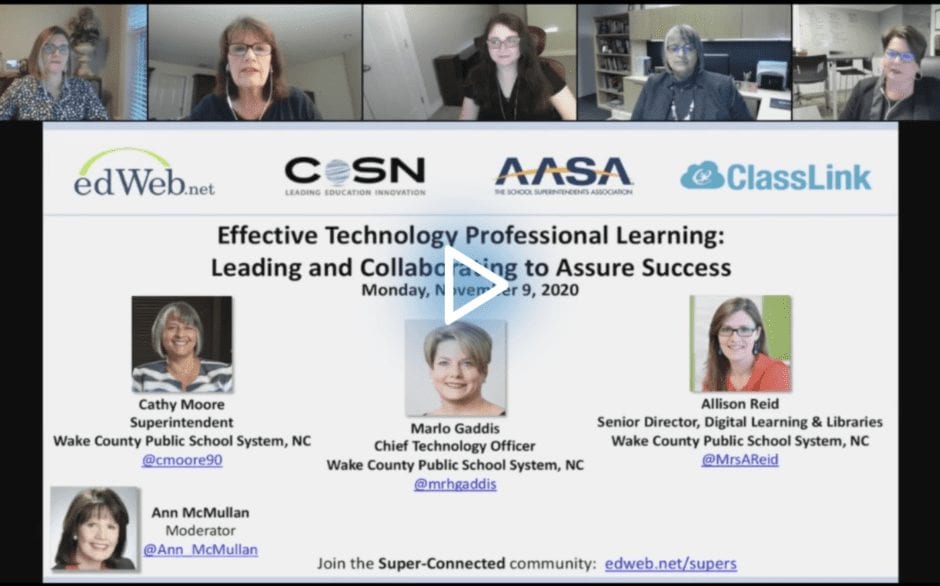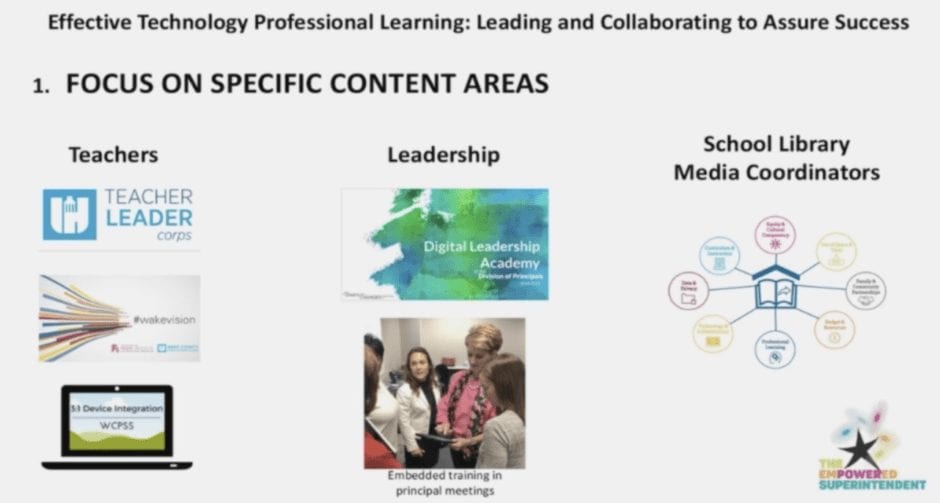Effective Technology Professional Learning: Leading and Collaborating to Assure Success
By Eileen Belastock
“Despite decades of existing research, most professional development programs fail to adhere to established criteria for effectiveness. The Center for Public Education found that while over 90% of teachers reported that they engaged in some type of professional development during the year, most found it to be completely ineffective.”
In a recent edWebinar sponsored by ClassLink and co-hosted by CoSN and AASA, three district leaders from Wake County Public School System, Superintendent Cathy Moore, Senior Director of Digital Learning and Libraries Allison Reid, and Marlo Gaddis, Chief Technology Officer, discussed critical guidelines for implementing successful professional technology development.
Moore says that before any rollout of sustainable and effective professional learning, there are four factors that school leaders must consider. These include the direct correlation between the formulations of dedicated learning communities and instructional improvements, engagement of teachers in sustained social learning with mentors and peers, the combination of focused instruction and opportunities to test out concepts, and opportunities to gain meaningful feedback from colleagues.
Critical guidelines that can lead to successful and sustainable professional learning include specific content areas focus, opportunities for teachers to engage in hands-on learning, and professional learning experiences connected daily with classrooms. Gaddis explained how Wake County focused their professional learning by first identifying three groups: teachers, leadership, and school library media coordinators. By identifying similar-job teachers, the district provided specific and relatable resources and support. With their building leaders, the district ensured that professional learning was relevant to their roles, and the school community’s needs. With their school library media coordinators, the district focused on professional learning communities whose task was to create a district alignment for the digital information and literacy skills.
Providing opportunities to engage in hands-on learning while pre-COVID became even more crucial for district leaders during COVID for districts such as Wake County. Reid described the drive to give the teachers opportunities to pursue their education. Teachers were no longer “walking around with a hammer looking for a nail to hit because they knew this one tool, but rather, because they had more than one tool in their toolbox, could decide the most appropriate tool for the learning goal.” When planning for and evaluating professional learning opportunities, the presenters recognized that technology enables teachers to be engaged in sustained social learning with their mentors and peers. In Wake County, district leadership intentionally adopted policies and frameworks and provided time and expectations around teachers meeting together as a professional learning team. Moore emphasized that districts must prioritize planning time for each group identified to work with each other. “By sharing the pandemic burden and collaborating on each of our expertise, we can develop a much more efficient, effective product and strategy that we can share.”
The CoSN Driving K-12 Innovation report identified “technology vs. the pedagogy gap” as a hurdle to innovation in schools. When introducing new technologies that educators are expected to utilize, there is not always sufficient training, professional development, or time to effectively teach or integrate these tools within the curriculum. Ann McMullan, Project Director of the CoSN EmpowerED Superintendent Initiative, said that it is critical districts do not treat professional learning as an “event” but part of what is happening consistently in districts. “To have the resources on campus when people are back on campus, to go to someone and connect makes all the difference for leading and collaborating” in both our current pandemic situation and in the future.
This edWeb broadcast was sponsored by ClassLink and co-hosted by CoSN and AASA.
About the Presenters
Cathy Moore became the Wake County Public School System’s 10th superintendent in May 2018. She leads the 15th largest school system in the nation, with more than 160,000 students and 19,000 employees. Cathy, who was appointed in 2011 as the school system’s Deputy Superintendent for Academic Advancement, has dedicated her career to public education. In her former role as Deputy Superintendent for Academic Advancement, she was responsible for school administration, academics, special education, student support services and student assignment. Prior to that role, she was an area superintendent, a high school principal, a high school assistant principal and high school teacher. She began her career as a high school French teacher in the Nash-Rocky Mount Public School System. Cathy has a Master of School Administration from the University of North Carolina at Chapel Hill.
Marlo Gaddis is the chief technology officer for the Wake County Public School System. She served three other North Carolina districts of various sizes in the past as 21st century learning coordinator; lead teacher for technology (K-5) and media (K-12); lead teacher for math, science, social studies, and technology (K-5); district and school technology facilitator; and kindergarten and first grade teacher. Marlo serves on K12 Education Advisory Boards for the RTM K-12 Congress and Lenovo. She is on the Board of Directors for CoSN (Consortium of School Networking) and serves on the Executive Board as Secretary. She is a founding member and board member of the North Carolina CoSN (Consortium of School Networking) chapter and a CoSN CETL (Certified Educational Technology Leader).
Allison Reid is an experienced teacher, CETL certified technology leader, and Google Certified Trainer who is certified English, Theatre Arts, and Technology, with a Master of Education (MEd) focused in instructional technology from NC State University. Allison is a member of the Wake County Public School System’s Digital Learning & Libraries team where she serves as their senior director. She also served as WCPSS’s 2014-15 Teacher of the Year, has been a member of the WCPSS Strategic Planning team, and was awarded the CoSN NextGen Emerging EdTech Leader in 2019. Her experience as both a teacher and a technologist enables her to ensure that administrative policy results in positive student outcomes in the classroom.
About the Host
Ann McMullan is Project Director for CoSN’s Empowered Superintendents Initiative. Ann served as Executive Director, Educational Technology in the Klein Independent School District, near Houston, Texas until September 2013, when she and her family moved to Los Angeles, California. For 16 years Ann led the district team that provided professional development on technology and 21st century instructional strategies to 4,000 professional educators serving 50,000 students. Ann served as co-chair of Texas Education Technology Advisory Committee which developed the Texas Long Range Plan for Technology, 2006-2020. Today, Ann is based in Los Angeles working as a public speaker, writer, and education consultant focused on leadership and planning to meet the needs of today’s students. Ann serves on the Project Tomorrow advisory council and is a leadership consultant with Executive Service Corps of Southern California, serving non-profit associations. Ann co-authored Life Lessons in Leadership, a guide for leaders ages eight to 88.
Join the Community
Super-Connected is a free professional learning community on edWeb.net for school superintendents, district leadership, and aspiring district leaders.



Eileen Belastock, CETL is the Director of Technology and Information for Nauset Public Schools, MA, and also works with edWeb.net to write articles on their professional learning edWebinars. You can follow Eileen on Twitter @EileenBelastock.





Comments are closed.